Why is ERP Important? How it Works, Implementation & Important Modules
What is ERP? ERP is a system that can automate various business processes. Read this…
Cynthia
December 18, 2024There is no such thing as the best ERP software. ERP exists to automate and integrate business processes, and every company’s business processes are different, with different pain points and different solutions.
What you need to find is the ERP software that best suits your business needs, along with the right implementer who understands your pain points, can provide customized solutions, at the right price points, and be a reliable support when your business needs them the most.
With more than 600 ERP software today, it is really difficult for us to review and rank them. However, we tried to narrow them down to 10 according to the most common review found and ranked the best ERP systems in the market today to help you choose the right solution for your business.
Our ERP software comparison criteria are general features, unique features, pricing transparency, employee self-sufficiency, compatibility with third-party integrations, and availability of Indonesian partners to provide implementation and support. All ratings are determined solely by our team.
Read more: What Is ERP (Enterprise Resource Planning) – A Complete Guide
Best for companies within Microsoft ecosystem
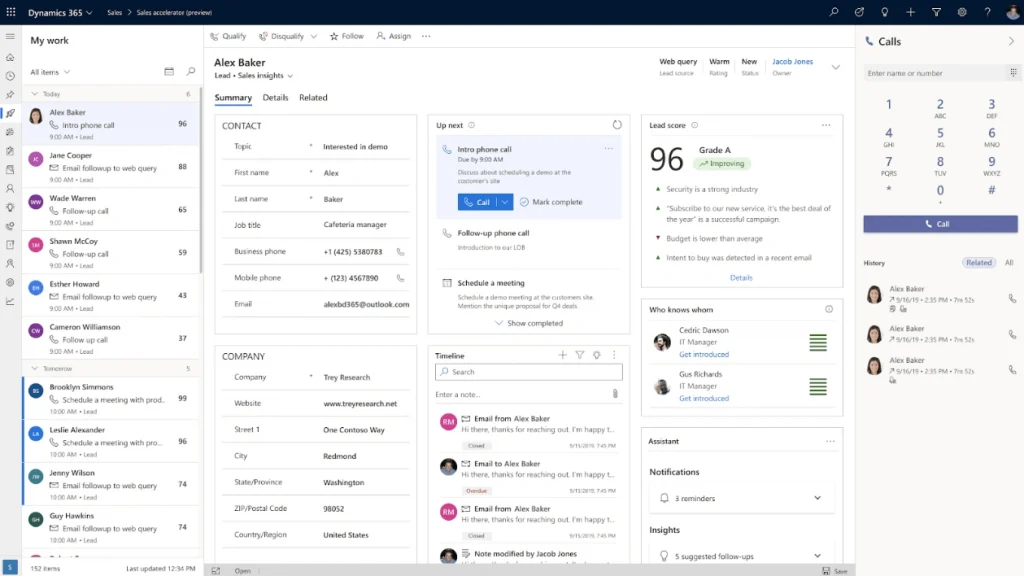
Microsoft Dynamics 365 Business Central is a reasonably-priced ERP system best for companies within the Microsoft ecosystem. Some noteworthy features include stock replenishment prediction and its mobile app.
It has the option to link the system to Microsoft Office tools, such as Outlook and Excel, to improve experiences for customers and employees.
With 49 official partners in Indonesia, implementation costs are reasonable and getting customer support should not be an issue.
Who is it for: Companies within Microsoft ecosystem
Starting price: $70 per user per month, 30 days free trial
Pros and cons
| Pros | Cons |
| Link to Microsoft Office tools | Requires a learning curve |
| Reasonable price | Reports may be difficult to understand |
| Simple design | Can be slow sometimes |
Best open source
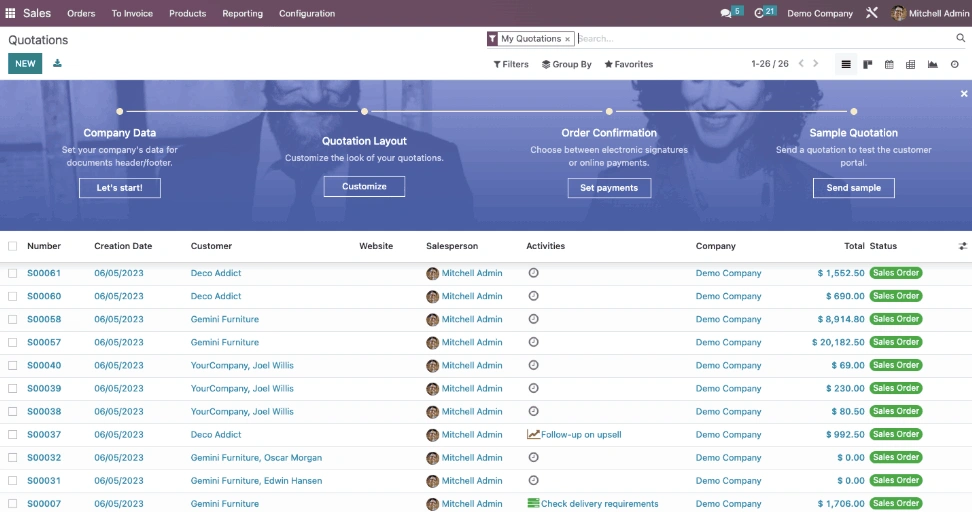
Odoo comes with two editions: Odoo Community and Odoo Enterprise. Odoo Community is open source, which means the source codes are available to use and edit for free, while Odoo Enterprise is the paid version. The main difference between the two is that Odoo Community doesn’t have an accounting module, which is crucial in an ERP system.
The licensing fee of Odoo Enterprise is very enticing at Rp 170,000 per user per month, with all 48 modules included.
Even though there are 42 Odoo partners in Indonesia, since Odoo is a relatively new ERP system in Indonesia, not many of them have the experience handling complex implementation. We recommend you to choose an implementer based on their understanding of accounting, business process, and the Odoo system limitations.
Who is it for: Small businesses implementing ERP for the first time
Starting price: Rp 170,000 per user per month (official Odoo price for Indonesian users)
Pros and cons
| Pros | Cons |
| Odoo Community is open-source | Choosing a reliable partner can be tricky |
| Odoo Enterprise provides great value (all modules for one price) | Many customizations may be required for medium-sized companies |
| Modular and customizable | Can be slow sometimes |
Impact is an official Odoo Partner. Learn more about our Odoo services.
Best for medium-sized manufacturing companies with operational focus
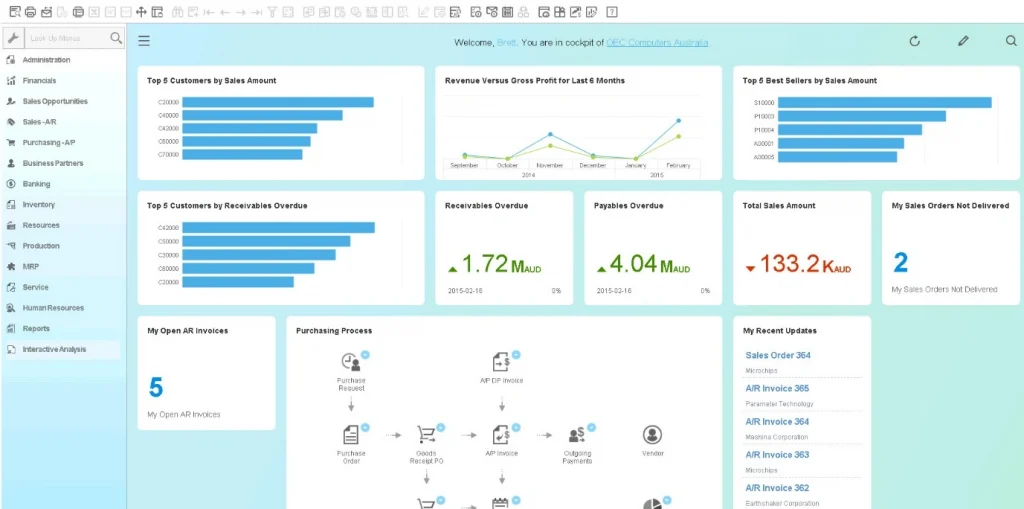
SAP Business One is SAP’s most popular ERP since it is SAP’s least expensive product. It is a reliable system rich in features, especially for mid-sized manufacturing companies. Although lacking in certain features (POS, HRIS), some implementation partners have built add-ons (at an additional price) to complete their systems.
Getting proper implementation and support in Indonesia is not an issue with their long standing presence in Indonesia, 25 official SAP partners, and their strict partner policy.
Who is it for: Medium-sized manufacturing companies with operational focus
Starting price: $108 per user per month (professional license)
Pros and cons
| Pros | Cons |
| Manufacturing features | No POS, CRM, and HRIS |
| Reliable partners | High learning curve |
| Cloud or on-premise available | Expensive |
Best value for Indonesian distributors, retail, and manufacturing
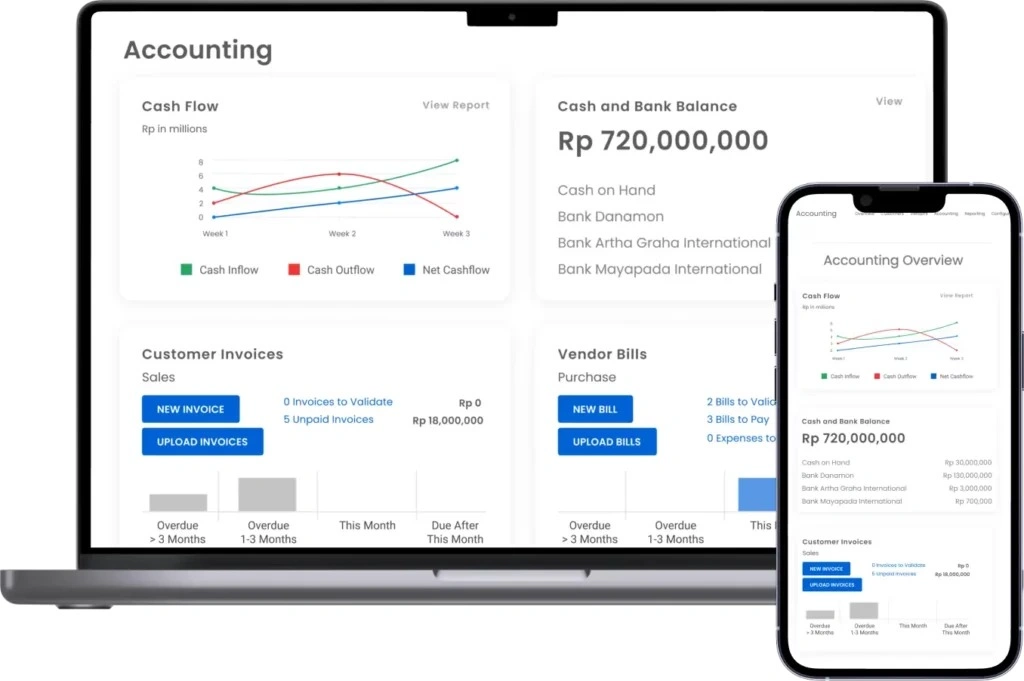
Impact is a cloud-based ERP software built specifically to solve the most common business pain points for Indonesian companies (sales, inventory management, manufacturing, and HR). It is modular, ready-to-use, customizable, and available on cloud or on premise.
Impact is easy-to-use with a low learning curve, yet rich in features commonly used by Indonesian companies such as e-Faktur, e-Bupot, PPh, BPJS, THR, and others. In addition, it supports multi-company and multi-warehouse at no additional cost.
Its mobile app is simple yet has features such as CRM with location tracking (for sales team), barcode scanner (for operations team), approvals and business analytics (for business leaders).
Impact’s mobile app can also be purchased separately and be integrated with other ERPs. This is great for companies already using SAP, Netsuite, Microsoft Dynamics, or in-house ERPs since they are mostly missing these features.
Who is it for: Small to medium-sized companies looking for ready-to-use all-in-one ERP
Starting price: Rp 200,000 per user per month, free trial available
Pros and cons
| Pros | Cons |
| Includes POS, CRM, HRIS, and mobile app | Only suitable for distribution, retail, and manufacturing companies |
| Indonesian accounting, tax, and payroll features | Can be slow when generating reports |
| Ready-to-use, modular, customizable |
Best for distributors looking for customizations
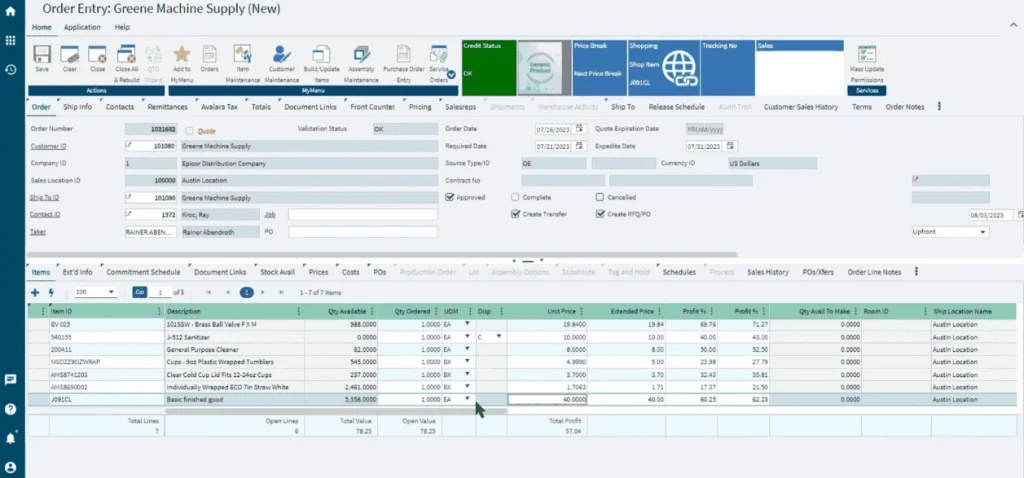
Epicor Prophet 21 is a cloud-based ERP system that’s specifically designed for wholesale distributors that need do-it-yourself customizations. It offers easy customizations for employee portals, forms, and reports.
However, although rich in features, the downside is that the learning curve is high. In addition, the system gets slow when generating reports.
With 22 Epicor partners in Indonesia, implementation and support should not be an issue.
Who is it for: Distribution companies that need customizations
Starting price: N/A, no free trial
Pros and cons
| Pros | Cons |
| Strong in distribution | High learning curve |
| Rich in features | Slow when generating reports |
| Customizability | Lack of features for Indonesian companies |
Best for employee efficiency
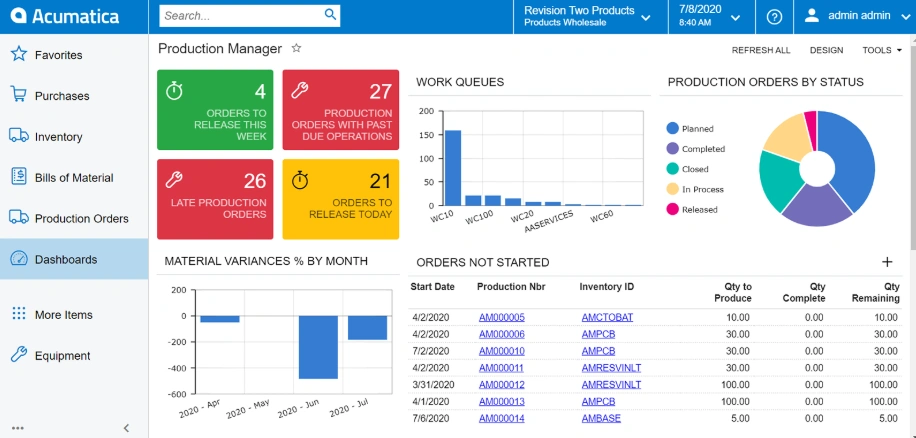
Background
Although less well-known in Indonesia, Acumatica is relatively well-known worldwide. Its key features are its role-based views and dashboards for business, finance, information technology (IT), operations, sales and marketing teams.
Through Acumatica’s robust reporting, users are able to monitor essential KPIs, such as profitability, revenue, operating costs, working capital and customer satisfaction. This will equip teams with the knowledge and resources they need to complete their jobs efficiently and maximize productivity.
However, implementation and support may be limited since Acumatica only has 4 known partners in Indonesia.
Who is it for: Companies with a goal to improve employee performance and efficiency
Starting price: N/A, no free trial
Pros and cons
| Pros | Cons |
| Role-based reporting for various roles | Lack of implementation partners in Indonesia |
| Manufacturing features | Lack of features for Indonesian companies |
Best for cloud performance
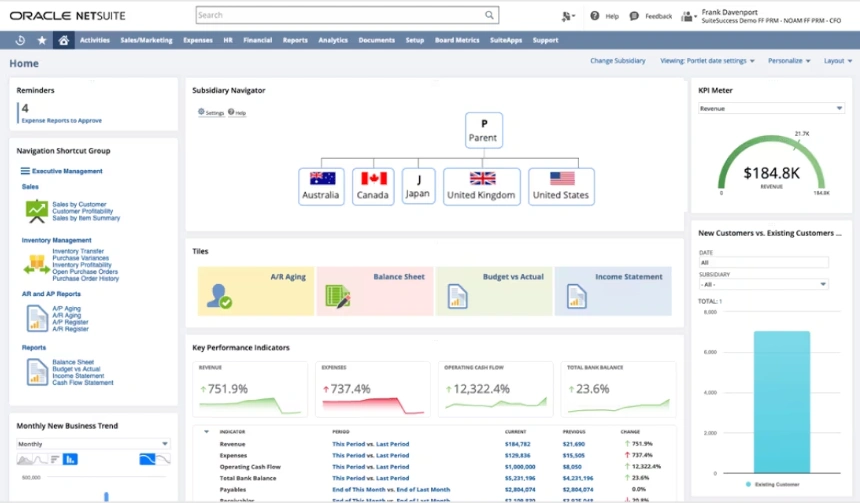
Netsuite is known to have a strong cloud infrastructure, allowing them to have a faster loading speed and faster real-time updates, especially on its mobile app. We also think Netsuite has the best UI design.
However, Netsuite is not available on-premise. In addition, you will be charged $999 per company per month in addition to the monthly user fee (unless you opt for the Starter Edition which will also cost you $999 per month). You will also have to be ready to pay for add-ons.
Netsuite has 8 known implementation partners in Indonesia. Although this may bring concerns regarding implementation and support, we’ve heard that Netsuite’s partner success managers are quite hands-on in helping partners with project planning and implementation, so we feel that this should not be an issue.
Who is it for: Companies willing to pay extra for cloud performance.
Starting price: $999 per company, no free trial
Pros and cons
| Pros | Cons |
| Cloud performance | Expensive |
| User interface | Lack of features for Indonesian companies |
Best for life science companies
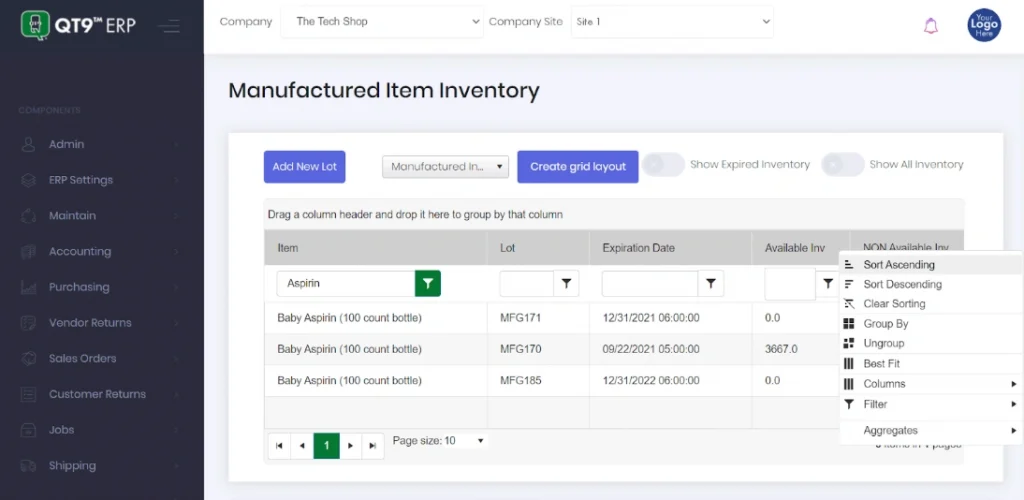
Background
QT9 was specifically created for organizations in industries, such as life sciences, medical devices, pharma, and biotech. It can help increase productivity, reduce inefficiencies, centralize data, and support growth.
Through QT9’s robust ERP system, companies may use real-time production data to optimize scheduling, stay up-to-date on inventory through built-in notifications and determine when various actions were taken.
In addition, QT9 makes it easy to track supplier pricing, enforce minimum purchase quantities, and create supplier backorders. Plus, sales can be connected with other business functions by linking orders to jobs, shipping and invoicing automatically and connecting sales numbers across multiple locations and departments.
Unfortunately, QT9 has no known implementation partners in Indonesia.
Who is it for: Life science companies
Starting price: N/A, 30 days free trial
Pros and cons
| Pros | Cons |
| Sales order tracking | No known implementation partner in Indonesia |
| Inventory breakdown screens | Lack of features for Indonesian companies |
| Manufacturing scheduling with real production data | Custom reporting can be difficult |
Best for nonprofits
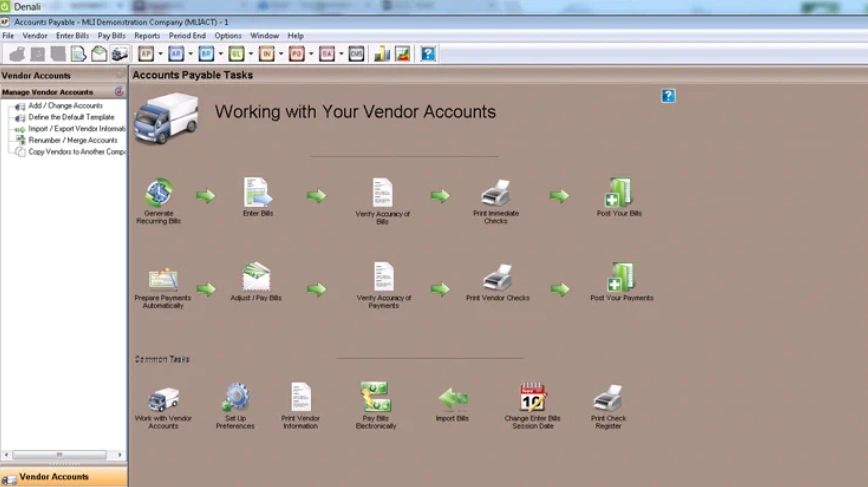
Background
Cougar Mountain Denali Summit is an ERP system with plenty of features for nonprofit organizations. With individual user rights and audit trails, you can prevent fraud and protect your hard work.
You may also manage multiple funds and take advantage of built-in Financial Accounting Standards Board (FASB)-compliant reports so that you avoid issues and set your organization up for growth.
Also, Cougar Mountain Denali Summit partners with NeonCRM to help you track fundraising and grants with ease. We can’t forget the interactive real-time key performance indicator (KPI) reports and other custom reporting so you know exactly where you stand financially.
Who is it for: Nonprofit organizations
Starting price: N/A, no free trial
Pros and cons
| Pros | Cons |
| Special tools for nonprofit organizations | No known implementation partner in Indonesia |
| Fraud prevention features such as individual user rights and audit trails | Lack of features for Indonesian companies |
| Customizable financial reports | Can be difficult to use |
Best for service providers
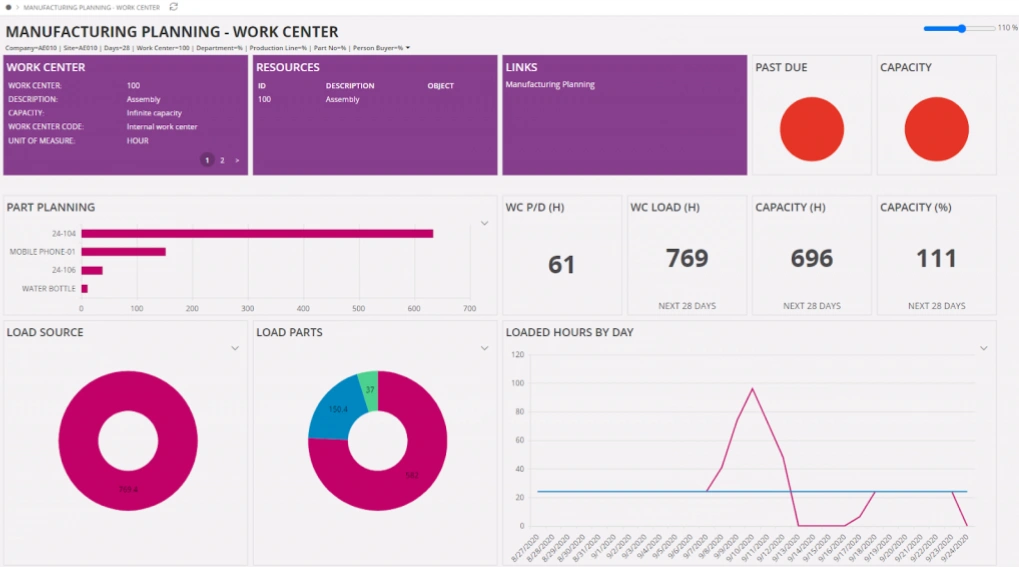
IFS is a Sweden-based ERP system strong in project and service management. UX is simple and its open API makes it easy to integrate with other core business systems. However, analytics and software integrations will cost extra.
Unfortunately, IFS does not focus on the Indonesian market. With only 2 implementing partners in Indonesia, implementation and support may be tricky for Indonesian companies.
Who is it for: Service providers
Starting price: N/A, no free trial
Pros and cons
| Pros | Cons |
| Project and service management | Lack of implementation partners in Indonesia |
| Simple design | Lack of features for Indonesian companies |
| Open API | Analytics and integrations costs extra |
The short answer is: when it can increase net profit and when company leaders can commit (because there may be other more urgent things that can increase net profit that leaders can focus on).
ERP is quite different from other business software because it’s the automation and integration that you are looking for. If you think team integration and process automation is not necessary for you, don’t get an ERP system. Just get accounting, CRM, or HR software separately. They are much cheaper.
The majority of ERP implementation failures are not due to the ERP system, but the lack of planning and top management involvement. Don’t choose an ERP system based on brand or hearsay. When you hear someone with bad experience badmouthing a certain ERP system, it is most probably because they chose the wrong implementer (most often with freelancers or IT consultants who don’t understand accounting and business processes).
Most often, the actual cost of implementing an ERP system ends up more than the initial assessment, so it’s better to start from ERP systems that cost half of your actual budget. Starting with Odoo vendors or a local ERP vendor is a good start. Go with the more expensive ERP software only when you know the affordable ones are not a good fit for you (only if you know you need certain features and the cost to customize those features are more than getting another more expensive ERP software.
If you are getting an ERP system for the first time, we always recommend businesses to implement the system without any customization in advance. This is because during your implementation process, companies often realize they have to change their business processes. When this happens, oftentimes their earlier concerns are already solved so there is no need to customize, or they realize there are more important features to customize.
We’ve heard a lot of stories where companies try to cut costs by hiring internal software developers or freelancers because they think those are cheaper.
Majority of them ended up in failures (freelancers disappear with bugs unfixed, internal software developers are unclear of what to build while companies blame them thinking it’s their jobs, etc.) and they ended up starting all over again with professional ERP implementers. It took them years longer and a lot of money going down the drain.
This is how we recommend you to filter your ERP vendors:
Start with the most affordable ERP system like Odoo or Impact. Find out who they are (visit their websites) and contact them to learn more about their ERP software. They may already have the customizations you are looking for without you paying for it.
Assess if they understand your pain points and are able to convince you that they can solve your pain points. A good ERP implementer can tell you exactly how from the point of view of software, business process, and accounting. You should avoid those who tell you that their ERP can do whatever you need without explaining how. Most often, they themselves don’t really understand what you are talking about.
Although this is not a bad way to do an initial assessment, it does not guarantee future success, either. Similar past clients can have different pain points, and you don’t really know if their implementation is a success or a failure. But there is no harm in asking.
Understanding how consulting companies hire their employees can oftentimes tell you about how much they value their customers’ success.
It is much better to choose the more expensive ERP vendor that is more likely to bring you ERP implementation success, than to choose the cheaper option but they end up in a mess and you end up paying 2-3 times the price.
Impact Insight Team
Impact Insights Team is a group of professionals comprising individuals with expertise and experience in various aspects of business. Together, we are committed to providing in-depth insights and valuable understanding on a variety of business-related topics & industry trends to help companies achieve their goals.
Ask about digital transformation, our products, pricing, implementation, or anything else.
We are excited to be part of your transformation journey from day one.